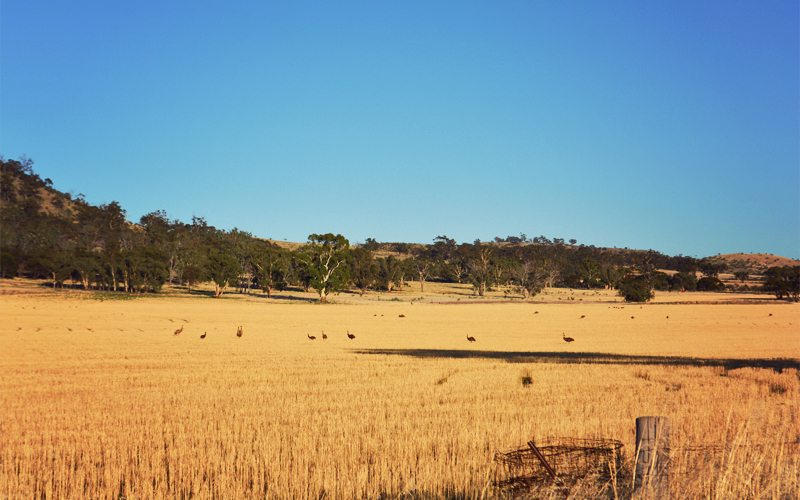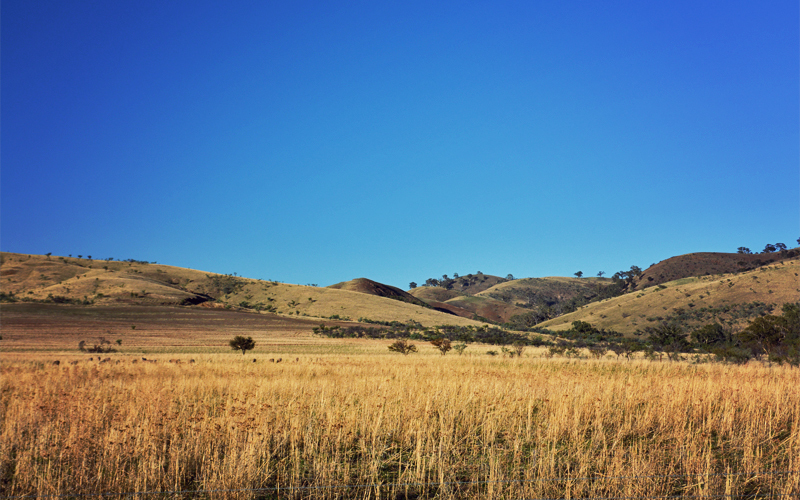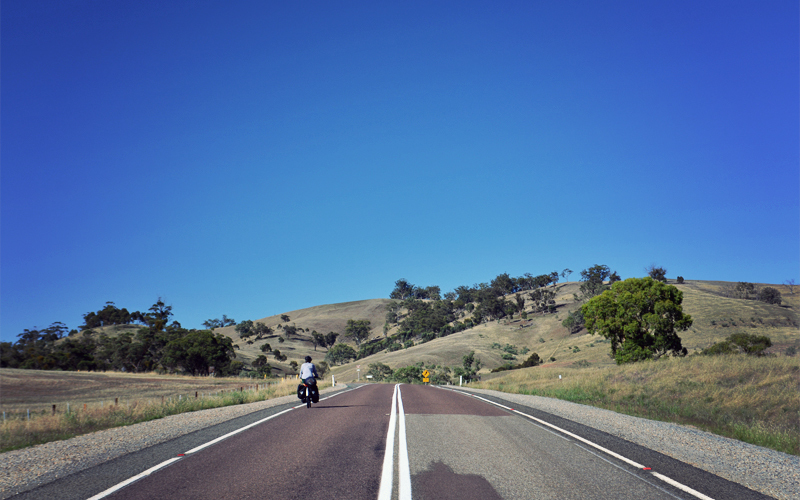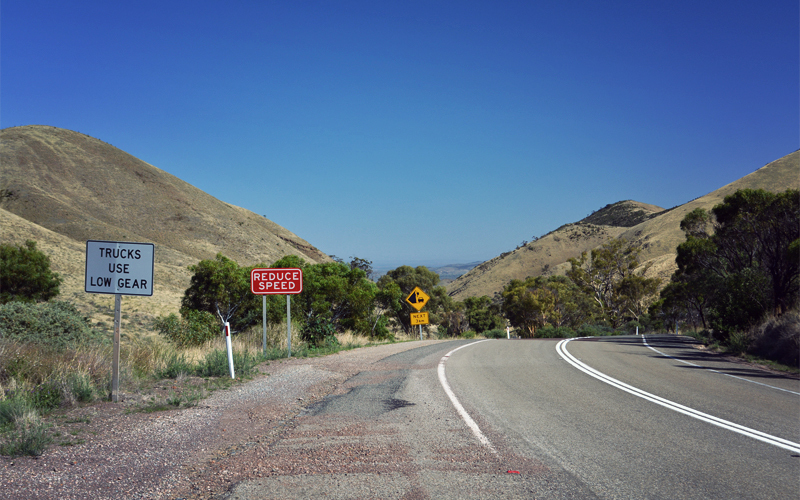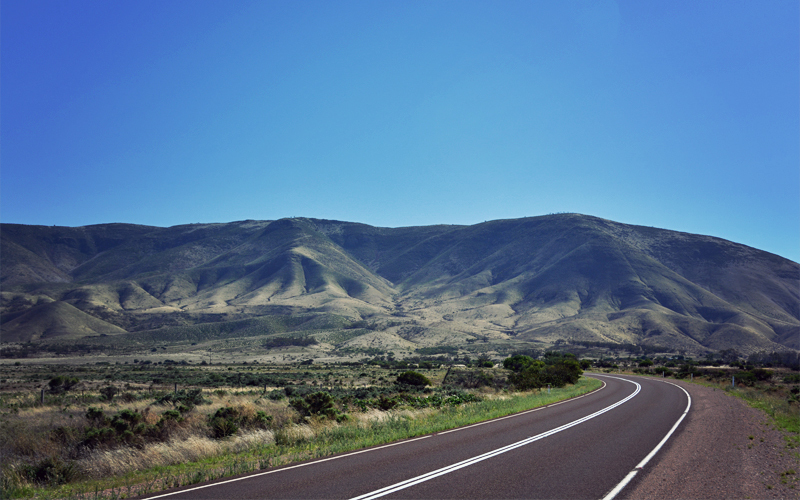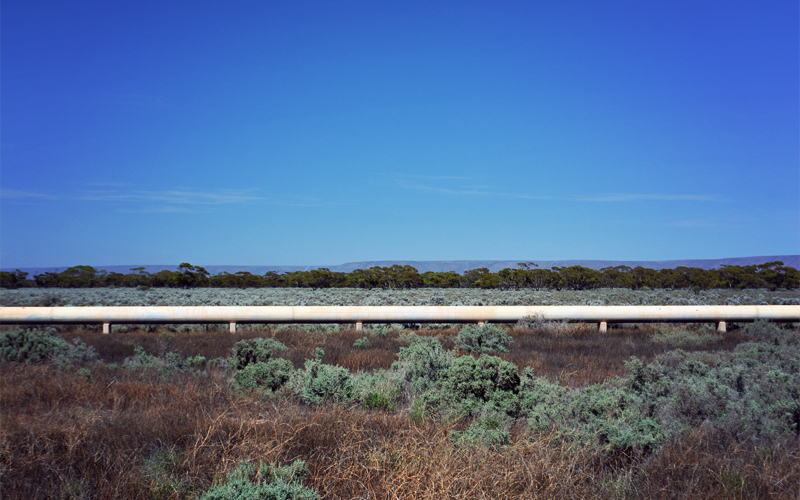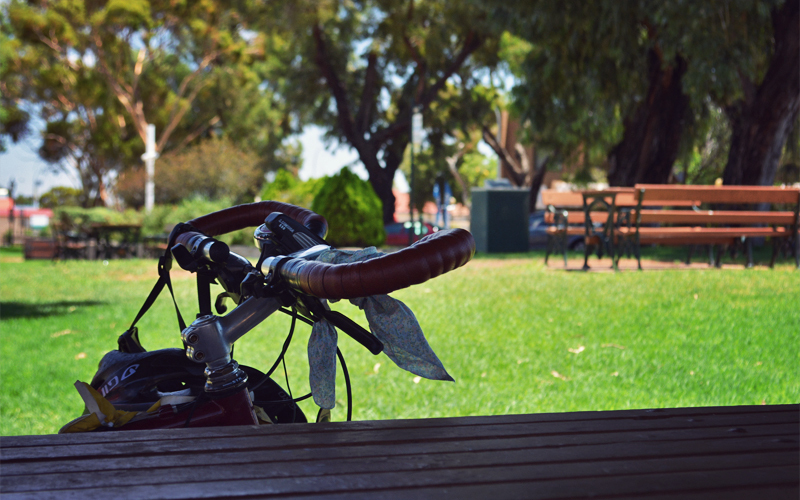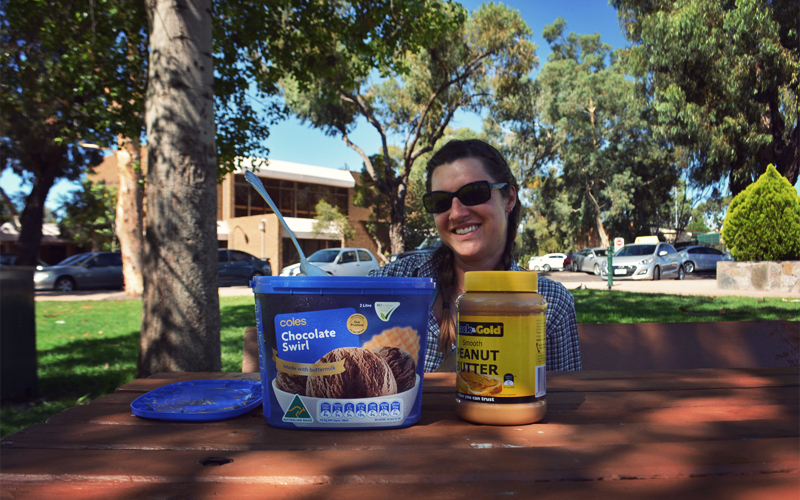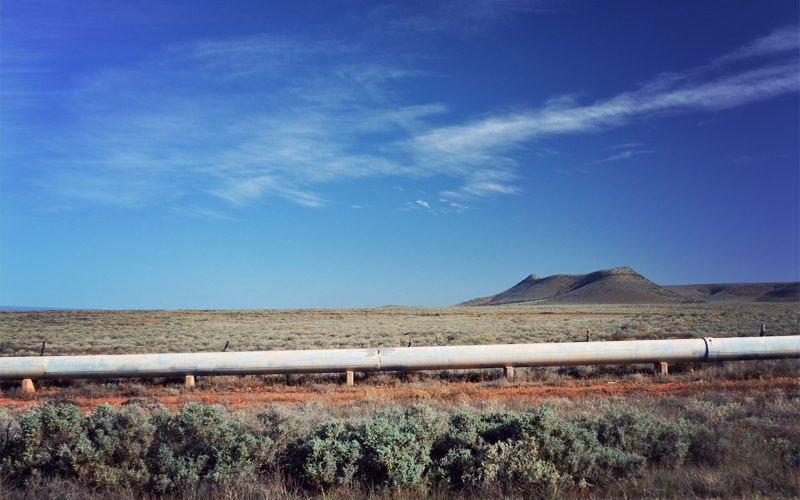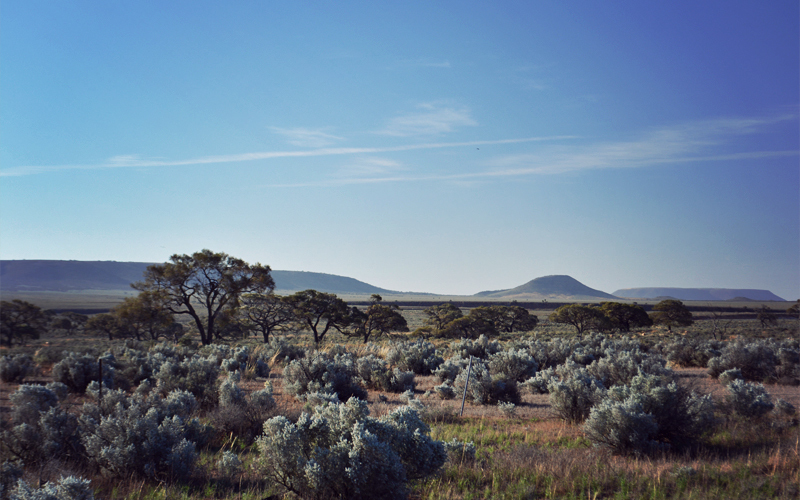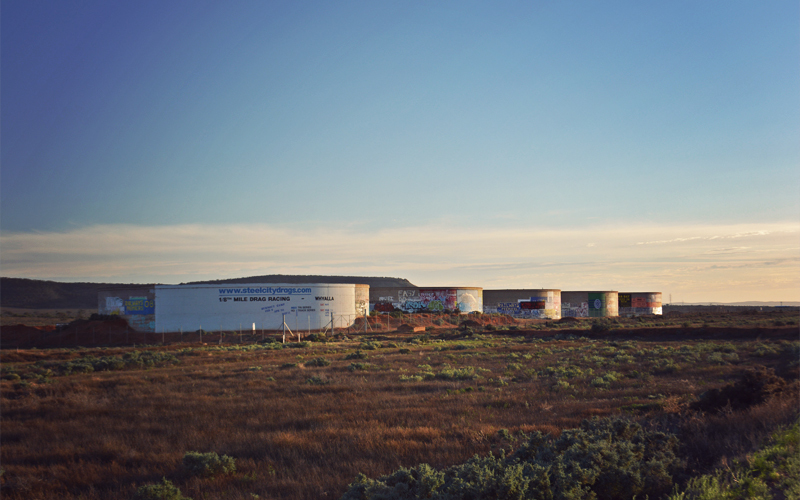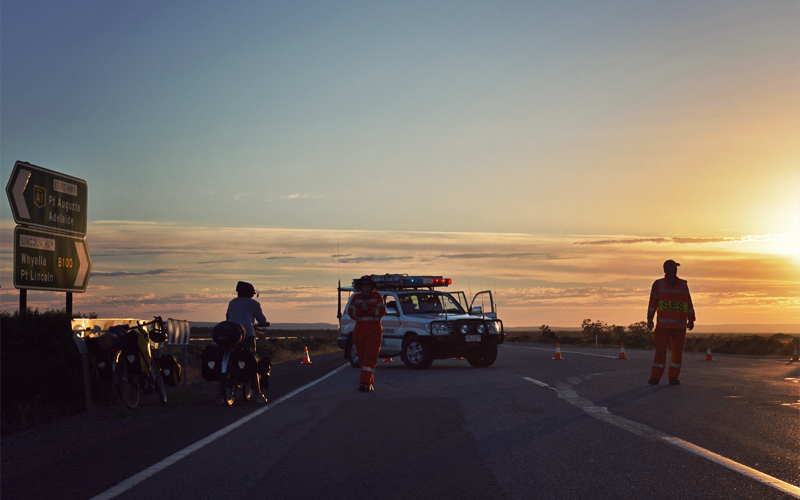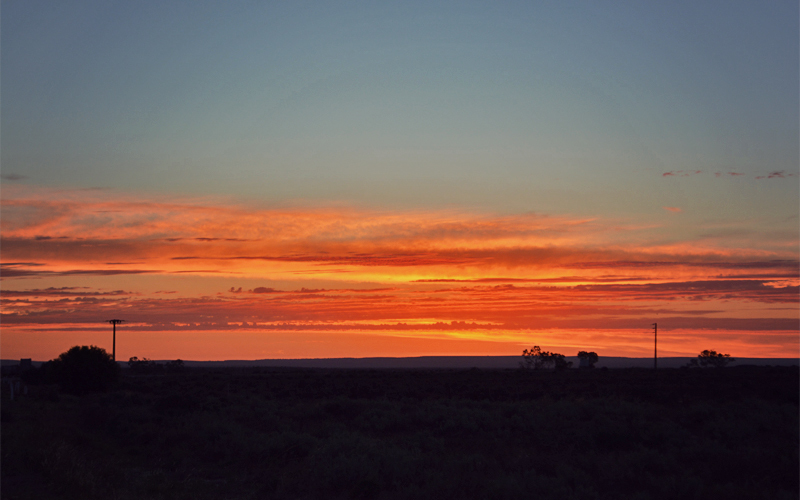January 22, 2015
Day 149: Mt. Remarkable National Park to 15 miles south of Port Augusta, SA
"It just feels good waking up in the forest," I say to Kristen as we start riding again.
"I know; I love it!" she tells me with excitement in her voice, a wide smile on her face, and a flash in her eyes.
Aside from the pair of kangaroos who woke us up in the middle of the night by bouncing within thirty feet from our tent we slept long and heavy. And we woke up without concern for where we were, what day it is, or where we're headed next. In the forest that's the rule, not the exception.
The air fills with the smell of gum trees, and soon we pass a wheat field where thirty or forty emus have emerged from the forest to graze, with the oldest ones watching us carefully as we roll by at slow speed. Beyond the next paddock I see spatters of blood reflecting back from the gray of the pavement, from the spot where a kangaroo was hit by a car. The little pools and streaks are so fresh that they still shine bright red in the glow of the rising sun.
We hang a left at Wilmington and right away the road starts to trend gently up. We know that it heads over Horrocks Pass, which gets us kind of excited, because we've only done a few big hill climbs in Australia and not one of them has been a pass. It seems like a goal worth accomplishing, and we're ready for it.
The highway goes up for a bit, then down a little, then up some more, but never too steep. The path of it sometimes becomes obscured as it bends left and right through the hills, but there's never anything like a hairpin or a switchback. We sweat more and breathe harder than we do on the flats, but never in excess. We just crank in the middle of the small chain ring for a mile or two at the end, and then we round a corner and we're there. There's no sign, just a crest in the road and a subtle dip down and toward the right. It's adorable. It's an adorable little pass over an adorable little mountain range. That's the only way you can possibly describe it.
The back side is a lot more exciting. It never stops heading down, and we fly at thirty to thirty-five miles per hour most of the way, leaning hard through the turns while looking up at the rock walls out of which the road was blasted. As we speed toward the bottom and brace ourselves against the wind that shoots down the canyon behind us, I try to imagine the next time we'll experience anything like it. And then I realize it won't happen until April or May, when we're bombing down some impossibly steep hill into a narrow hollow in the Appalachians, past semi-feral dogs, narrow streams that slip beneath the road in culverts, and dirty mobile homes where the floors sag in the gaps between the concrete blocks that pass for a foundation.
The Spencer Gulf and the eastern side of the Eyre Peninsula spread out before us as we descend to the west. Although the mountain range we crossed isn't that tall in absolute terms, it's so much higher than the flat country that surrounds it. It means that as we coast down we can see the trucks on Highway A1 in the distance, the full length of the train that heads south parallel to the highway, and the sprawl of Port Augusta more than twenty miles away. The busy highway that follows is a just a busy highway, straight and noisy and kind of stressful, but at least a third of the passing drivers still wave and somehow that makes the thing seem not quite so bad.
Port Augusta welcomes us first with a prison, then follows it up with the stomach-churning shit-stink of massive effluent ponds. The city tries to offset this by placing artfully stacked piles of colored rocks next to the highway. (It doesn't work.) But the small downtown and central park are charming and inviting, and we spend the afternoon going between them and the air conditioned cool of the library.
The thing that stands out the most about Port Augusta is that it's the first place we've traveled where aboriginal people are part of the community. Even though we've covered more than 1,600 miles over the last five weeks, through Sydney and Adelaide and an unknown number of small towns along the way, until arriving in Port Augusta we had seen literally four people that fit that description. I know because I've been counting, and I've been counting because I wanted to know if what I'd read about the extreme isolation of aboriginals in Australia was true. But despite what the racist old white men of this country would tell you — and oh boy would they be happy to tell you — Port Augusta is not burning to the ground, no one's drinking in the park, and our bikes aren't stolen within ten minutes of parking them in front of the library, even though every fourth or fifth person who passes by looks different than we do. It's a place where people read books aloud to their kids, go for a walk, or buy Chinese takeaways, just like every other 13,000-person town we've been to.
To be fair, when we hit the western edges of town it becomes clear that day drinking is a favorite hobby in Port Augusta, but it's the sort of thing that everyone's taking part in. It also helps explain the car that just out of town passes us on the left, in the dirt, because the shitfucker behind the wheel can't wait four seconds for the car coming in the opposite direction to go by. Beyond that it's just huge side winds, barbed wire attached to fence posts made from tree branches, a pipeline hauling who knows what, a couple of emus, the gate to a military firing range, and a whole lot of nothing at all. Minus the nearby machine guns, this could very well be the description for the next three weeks of our lives.
When our empty side road ends we spend a few more miles back on the A1. But rather than continue due west with all of the road trains and caravans and SUVs that look like they've been outfitted for the apocalypse, our plan is to head south for about a hundred miles on the eastern side of the Eyre Peninsula before crossing over to the west side and meeting back up with the A1 next week in Ceduna. It's a great plan until we get to the junction, where flashing lights and orange cones and authority figures wait for us.
A middle-aged man and woman in bright orange jumpsuits stand in the middle of the road, stopping every vehicle that approaches from the direction of Port Augusta. They're part of the State Emergency Service.
As we roll to a stop they ask us which direction we're headed. I tell them we're going toward Whyalla.
"The road to Whyalla's closed," the man says. "If you want to get there you'll have to head up to Iron Creek, take a left, and then go down the back way. It's a real rough old road, that one. Of course you could also go back to that rest area you just passed. That's where the caravans'll sometimes stop. There's another up the road that way about ten k's too."
"What happened?" I ask
"Accident, a serious one," the woman tells us. "A car and a truck. Head on. Not good."
"When's it going to reopen?"
"Don't know," the man says. "Could be later tonight. Could be in the middle of the night. Could be sometime tomorrow. You never know with these things."
And so we're stuck.
With evening heading toward night, we turn around and ride the quarter mile back to the rest area. We set up the tent on a patch of gravel in the rest area, and with the last bits of light disappearing into nothing we jump inside. Within moments our world fills with the downshifting and compression braking of trucks approaching the junction and the acceleration and shifting of trucks heading away from it. All of this happens less than a hundred feet from where our heads lay. It would seem that a long night awaits.
Today's ride: 54 miles (87 km)
Total: 4,878 miles (7,850 km)
| Rate this entry's writing | Heart | 2 |
| Comment on this entry | Comment | 0 |
